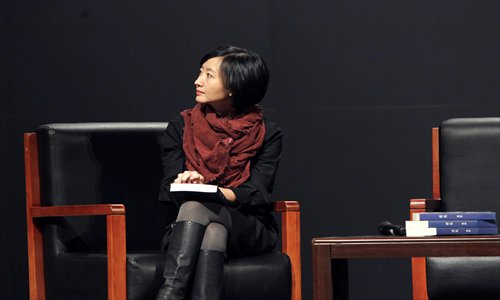A reporter's Insight

"You report on yourself the way you report on a country," writes Chai Jing, on the back cover of her second book, Kanjian, or Insight, published earlier this month.
Born in Linfen, Shanxi Province, in 1976, Chai is a well-known journalist and TV host of China Central Television (CCTV), working on the forefront of breaking news.
Chai has worked since 2011 on several influential programs, including News Probe, One on One, 24 Hours and the current one, Insight, the same name as her book.
Already, more than one million copies of the long-awaited book have been sold. As of this Tuesday, the grade for the book on douban.com is 9.4 out of 10, as graded by more than 6,000 people.
"Since Chai is a celebrity, the success (in sales) was anticipated. Actually we don't want to seem over-publicized," said Dai Xuelin, marketing manager of Guangxi Normal University Press' Beijing office.
But is it merely the celebrity effect that is causing Insight to fly off the shelves? Is Chai merely the product of packaging and promotion? The answers can be found in the book.
During the past decade, Chai has been part of China's greatest moments and most-watched issues. She has reported on China's fight against SARS in 2003, the 2008 Wenchuan earthquake, the controversial land requisition issues, the Yao Jiaxin murder case in 2011 and so on.
Those reports have impressed audiences all over the country and defined Chai as a top investigative journalist.
Many Chinese still remember this scene from 2003: a pale, lean face wrapped in a protective uniform, talking to patients face-to-face at risk of infection. A decade later, people still refer to Chai as the brave reporter who went into SARS wards.
All those memories are recorded in this book, along with the back stories beyond the lens and what Chai has seen and felt. It is both a documentation of Chinese society, depicting its changes in the past decade, and an autobiographical book of Chai's personal growth.
TV host Bai Yansong said at the book premier, "She is one of the best journalists in China, and will continue to be the best."
Chai has a gentle but sharp interviewing style. But instead of the calm and graceful host seen on TV, in the book, she reveals the awkward truths, including her first interview being a total disaster, and the period when she couldn't speak or write without feeling pretentious.
She shares genuine experiences and feelings that give insight into the personal growth of a celebrity journalist.
"I was pushed into (the career of) news, unsuspectingly," Chai said in the book's trailer clip.
Introspections and self-critiques are a great portion of the book. And there are some critiques against her from the outside too, accusing her of being "pretentious" and a "deified figure of CCTV."
A neat haircut, simple make-up, a sweater and a scarf - that's many people's idea of Chai.
In response, Chai said, in a December story in the Time Weekly, "I am responsible for being a public figure, and I value every opinion about the program. But me, myself, is not important."
Chai is of the "literary youth" born in the 1970s, a fact apparent not only from her style of dress, but also from this book and her ongoing blog. For example, the book is filled with sentimental and literary sentences, such as foam that felt like "death touching my face" in the chapter about reporting on SARS.
But as chapter 10 is named "the truth is often lost in tears," Chai's life and career have been all about finding truth.
"I just have one thought - I have to know," writes Chai.